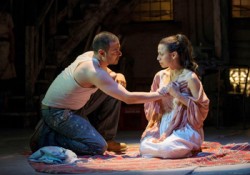By: Daisy Magaña
 “They can’t build a wall big enough for us,” were the words uttered by Socorro Santiago, who played “Tita” in Luis Alfaro’s Mojada, a re-imagined, modern-day interpretation of the classic Greek myth Medea. The wall “Tita” refers to is the great divide that is the physical barrier between the United States and Mexico. Mojada is a powerful performance that not only re-lives Euripides’ Medea but touches the hearts and emotions of the audience. The story of the Mexican immigrant is not unique to simply the Latino culture, but historically, many immigrants–regardless of the color of their skin–have experienced isolation, exclusion, and fear. Mojada touches upon issues of family, immigration, and the sometimes unsettling need to assimilate.
“They can’t build a wall big enough for us,” were the words uttered by Socorro Santiago, who played “Tita” in Luis Alfaro’s Mojada, a re-imagined, modern-day interpretation of the classic Greek myth Medea. The wall “Tita” refers to is the great divide that is the physical barrier between the United States and Mexico. Mojada is a powerful performance that not only re-lives Euripides’ Medea but touches the hearts and emotions of the audience. The story of the Mexican immigrant is not unique to simply the Latino culture, but historically, many immigrants–regardless of the color of their skin–have experienced isolation, exclusion, and fear. Mojada touches upon issues of family, immigration, and the sometimes unsettling need to assimilate.
In English, mojada/o means “wetback” and is used as a derogatory term for Mexicans who cross the border undocumented. Although Alfaro’s production focuses on issues of immigration, there are many underlying themes to explore. “Mojada is actually a love story about two people who come to this country and start to assimilate in two very different ways,” says Luis Alfaro. “The play is about what happens to the strain of a relationship when that happens. Because of that, it is a tragedy.” The characters share in the frustrations of survival and each face their own form of seclusion.
Many of the lines delivered by the actors show the struggle between adapting to changing times in a foreign culture and the sacrifice that comes along with the journey. In one scene, Santiago “Tita” distinguishes an important aspect of “success” and the American Dream many immigrants strive for: “Success: you don’t buy it, but pay for it”. Actor Sandra Marquez embodies “Armida” who creates meaning for assimilating to the new world. She recognizes how to be a part of the system and play it for her benefit, disregarding human emotional attachment.
This production also raises an important aspect of the immigrant experience: do their values and traditions become outdated in a foreign country? The immigrant “sinks or swims,” you either get with the changing times or get left behind in the past. As Juan Francisco Villa’s character says, “you can’t let the past become the present.” The play carries a strong constant opposition between what was and what is—the past and the present. “Theatre is a forum, a mirror to see ourselves and all of our emotions on display,” says Alfaro. “I hope that end of this play, we look around and ask ourselves how we belong not only to ourselves, but to each other as a city. How do we make a great city for everyone?”
Mojada dives deep into an immigrant’s experience of not only the journey of crossing the Mexican-American border, but humanizes an issue full of controversy and degradation occurring not only in Chicago, but throughout our nation. It shows how areas can change depending on who lives there and how that change shifts society’s mentality.









